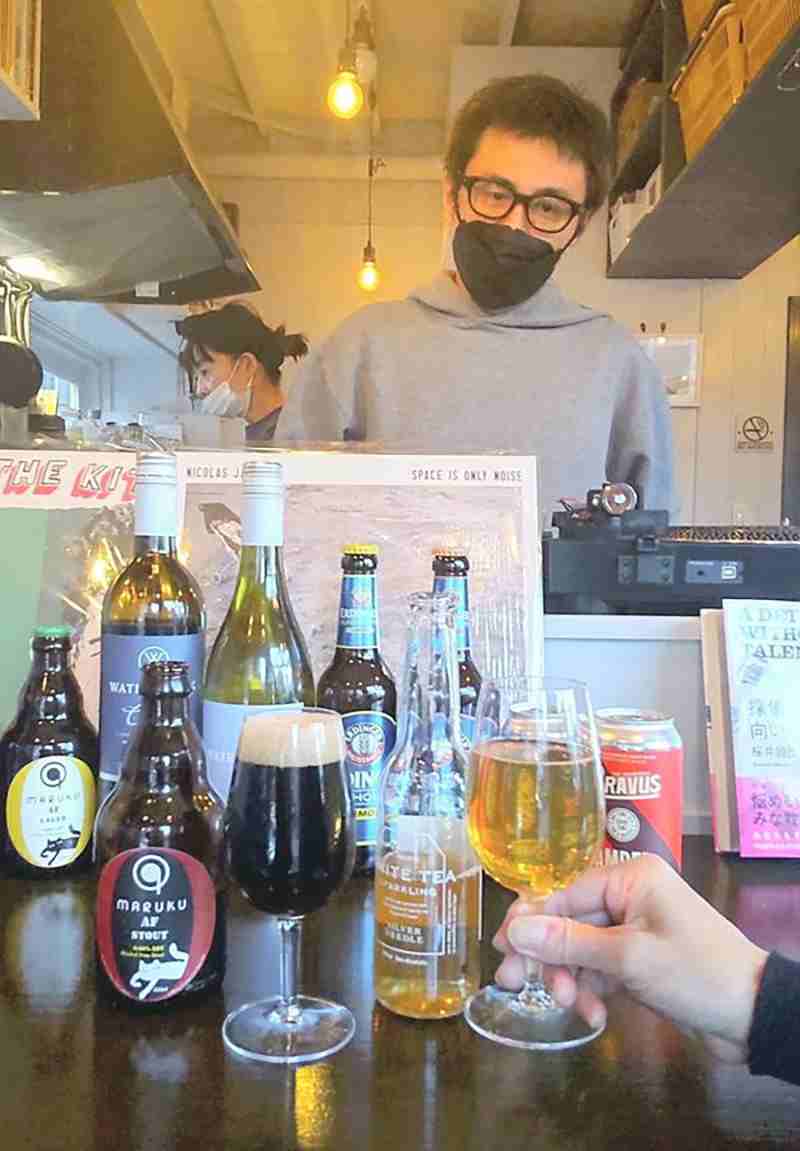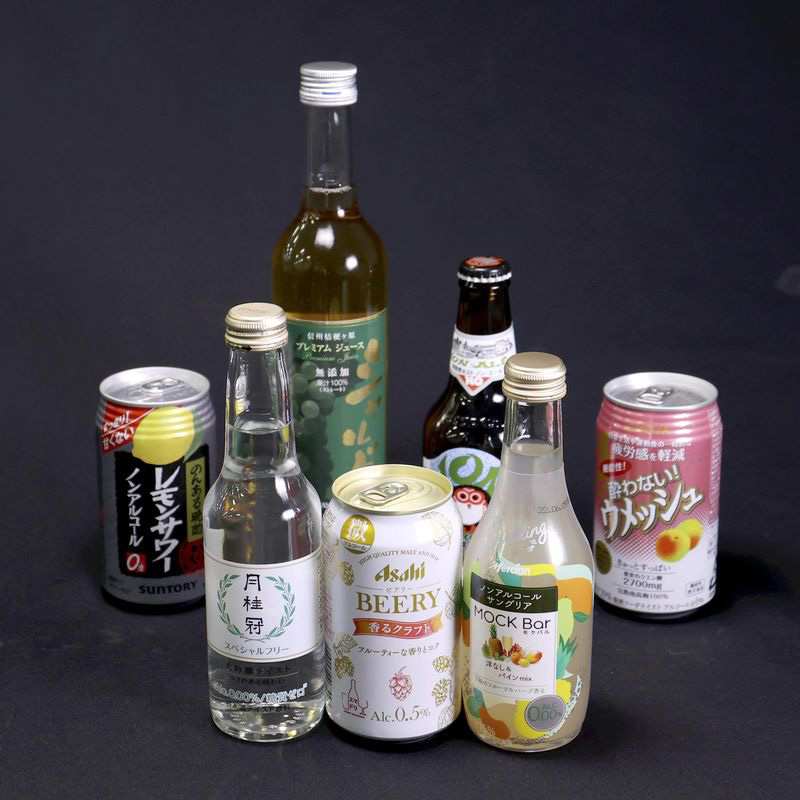
Suzumo Sakurai stands behind a counter lined with nonalcoholic beverages at his cafe in Meguro Ward, Tokyo. “You can feel as if you are enjoying alcoholic drinks.”
10:59 JST, December 26, 2021
Though not yet a groundswell, interest is rising in the so-called sober curious lifestyle, in which people swear off alcoholic beverages regardless of their health condition or physical makeup.
It seems that such people have realized the benefits of spending time on more useful purposes instead of drinking.
“Considering the remaining time of my life, I feel it’s wasteful to spend time being drunk and suffering from a hangover,” said Suzumo Sakurai, a 53-year-old novel writer.
In January last year, he stopped drinking, though he had drunk alcoholic beverages almost every day until then. Before that, he often worried about his alcohol habit. Once he stopped drinking for several days, he was surprised to notice that a day felt so long, he said. “I could spend time on various other activities such as reading books and watching movies.”
Since he stopped drinking, his sleep has improved and he feels refreshed both physically and mentally in the mornings.
His familiarity with tasty nonalcoholic beers and beverages with wine flavors largely contributed to his decision. He wanted other people also to enjoy nonalcoholic beverages, so he began online sales of the products.
In May this year, Sakurai opened Low Alcoholic Cafe Maruku, an eatery serving nonalcoholic drinks, in Meguro Ward, Tokyo.
Sakurai said, “If I had continued drinking, I would not have been able to overcome the current busy circumstances.”
The term “sober curious” is believed to have been introduced in a book by British journalist Ruby Warrington that was published in 2019. A version of the book translated into Japanese was published by Hojosha with the Japanese title, “Nomanai Ikikata (Way of living without drinking) Sober Curious,” in November this year. Sales of the book have been brisk.
The sober curious concept is especially taking hold among younger people.
According to the Health, Labor and Welfare Ministry’s 2019 National Health and Nutrition Survey, a majority at 55% of respondents did not drink alcoholic beverages. A total of 18% replied that they rarely drink or they have stopped drinking, though they can consume alcoholic beverages. Among those in their 20s alone, 27% replied so.

Non- and low-alcoholic beverages
“Spending behaviors of younger generations are rational, and they strongly want to better utilize the time they have. They think drinking alcoholic beverages has low benefits,” said Naoko Kuga, a research fellow of NLI Research Institute.
Also because people’s consciousness about health has risen amid the novel coronavirus pandemic, Kuga said, “An increasing number of people in all generations are likely to take to the sober curious lifestyle from now on.”
At home and abroad
Warnings about developing drinking habits are now a worldwide trend. The World Health Organization adopted a guideline in 2010 aiming to reduce the excessive consumption of alcoholic drinks.
The United Nations’ Sustainable Development Goals also include a phrase to “strengthen the prevention and treatment of substance abuse … and harmful use of alcohol.”
Companies in the alcoholic beverage sales industry have therefore implemented efforts in recent years to promote appropriate ways of drinking.
Asahi Breweries Ltd. touted the slogan, “smart drinking,” while Suntory Holdings Ltd. adopted “drink smart,” and Kirin Holdings Co.’s new slogan is “slow drink.” The companies are launching such campaigns with increasing choices of nonalcoholic beverages, promoting low-level alcoholic drinks and indicating quantities of alcohol on labels of their products.
Toshiaki Yamada of Sakebunka Institute Inc., a private research company that looks at alcoholic beverage cultures, said that people have been facing fewer occasions in which they are obligated to drink, such as at workplace gathering or other celebrations.
In addition, chances to associate with others have been limited due to the pandemic, thus providing opportunities to reexamine the meaning of drinking itself.
“Favorable circumstances have been prepared for not only people who habitually drink but also those who do not drink and those who want to pursue different ways of drinking based on the situation and their physical condition,” he said.
Top Articles in Society
-

Man Infected with Measles Reportedly Dined at Restaurant in Tokyo Station
-

Man Infected with Measles May Have Come in Contact with Many People in Tokyo, Went to Store, Restaurant Around When Symptoms Emerged
-

Woman with Measles Visited Hospital in Tokyo Multiple Times Before Being Diagnosed with Disease
-

Australian Woman Dies After Mishap on Ski Lift in Nagano Prefecture
-

Foreign Snowboarder in Serious Condition After Hanging in Midair from Chairlift in Nagano Prefecture
JN ACCESS RANKING
-

Japan PM Takaichi’s Cabinet Resigns en Masse
-

Japan Institute to Use Domestic Commercial Optical Lattice Clock to Set Japan Standard Time
-

Israeli Ambassador to Japan Speaks about Japan’s Role in the Reconstruction of Gaza
-

Man Infected with Measles Reportedly Dined at Restaurant in Tokyo Station
-

Videos Plagiarized, Reposted with False Subtitles Claiming ‘Ryukyu Belongs to China’; Anti-China False Information Also Posted in Japan





















